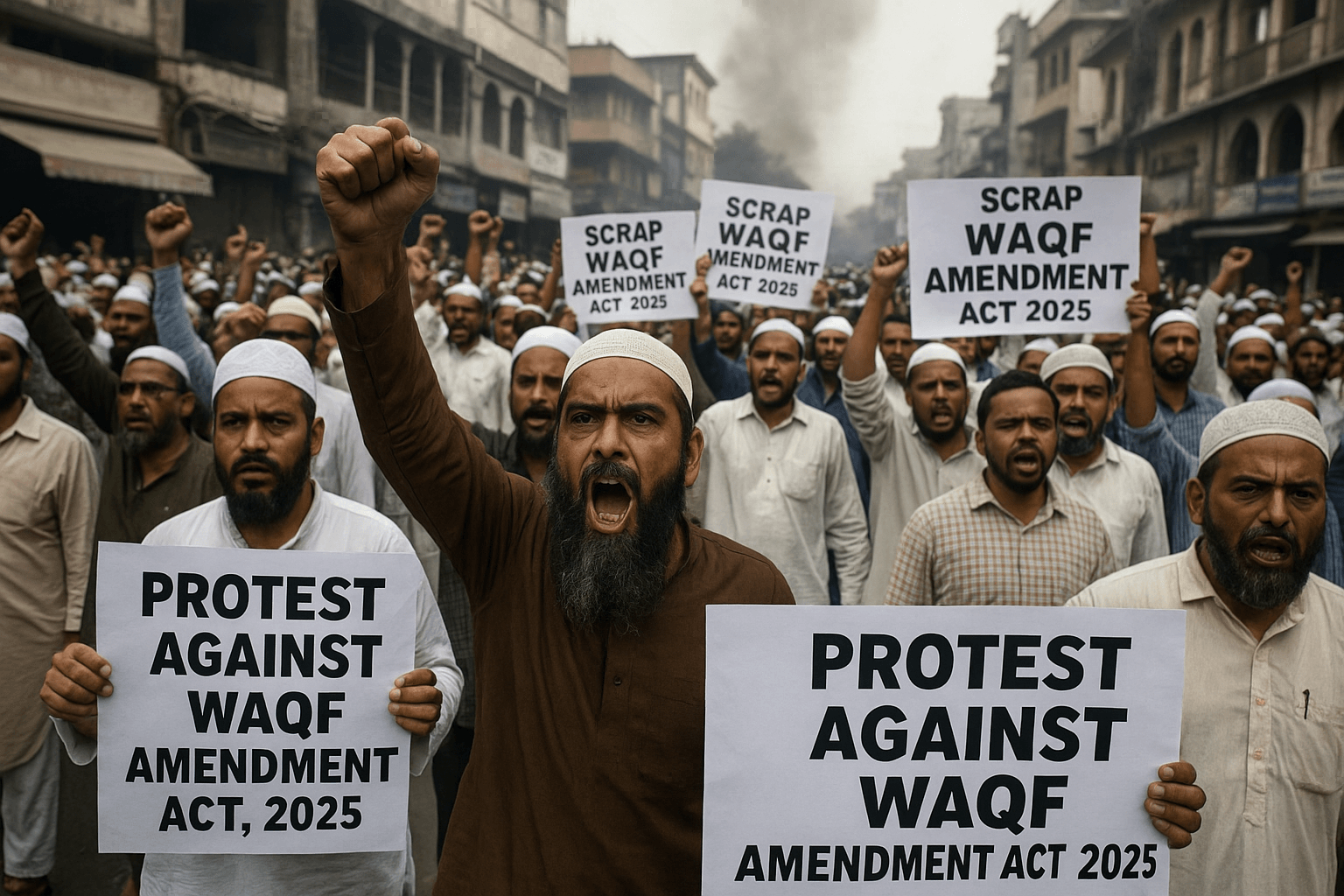🕌 India: Protests Over Waqf (Amendment) Act, 2025
In April 2025, India witnessed a fresh wave of unrest as protests erupted in response to the newly passed Waqf (Amendment) Act. The law, which redefines the governance of Muslim religious endowments known as waqf properties, sparked immediate backlash from minority groups.
Activists claim the legislation allows the government excessive control over properties meant for religious or charitable use, undermining centuries-old traditions. Demonstrations in areas like Murshidabad and Unakoti turned chaotic, prompting the deployment of paramilitary forces and localized curfews. In some districts, internet access was shut down to prevent mass mobilization.
While the government argues that the amendments aim to bring transparency and curb mismanagement, critics remain skeptical. “This isn’t about reform—it’s about control,” said one protester in Kolkata. Minority rights organizations are calling it an attack on religious freedom and a violation of constitutional rights.
With legal petitions now reaching the Supreme Court, the controversy reflects deepening divisions in India’s social fabric. The outcome could set a precedent for how the country balances governance with religious autonomy in the years to come.
⚖️ United Kingdom: Supreme Court’s Gender Definition Ruling
In a landmark decision on April 17, 2025, the UK Supreme Court ruled that the word “woman” in the Equality Act 2010 refers strictly to biological sex. The verdict has stirred intense public debate and sent shockwaves through LGBTQ+ communities across the nation.
Supporters of the ruling say it’s a necessary clarification to protect the integrity of single-sex spaces such as shelters and prisons. But opponents argue the decision erases the lived realities of transgender individuals. “This is a huge setback for our rights,” said a protester at a rally in London. “It’s not just legal—it’s deeply personal.”
Thousands took to the streets holding placards that read “Trans Rights Are Human Rights” and “We Won’t Be Erased.” Social media buzzed with hashtags like #EqualityForAll and #ProtectTransLives, sparking global conversations about identity, inclusion, and legal frameworks.
The government has not yet indicated whether it plans to amend the Equality Act in light of the ruling. Meanwhile, advocacy groups are doubling down on efforts to push for broader legislative reform.
This decision adds fuel to an already charged debate over gender identity in the UK, posing complex questions about how laws can—or should—evolve alongside shifting social norms.
🌍 Brazil: G20 Social Summit Shines Light on Inequality
This past week, Brazil hosted the G20 Social Summit, putting a spotlight on inequality, poverty, and sustainable development. Held in São Paulo, the summit gathered global leaders, activists, and community representatives to address long-standing socioeconomic issues facing low-income populations.
The voices of Brazil’s favela communities rang loud and clear. Delegates from grassroots organizations highlighted the need for basic infrastructure—clean water, healthcare, and housing—often overlooked in international policy discussions. “We don’t want charity, we want dignity,” said Marcia Oliveira, a community organizer from Rio de Janeiro.
The Brazilian government emphasized its commitment to inclusive growth, rolling out initiatives aimed at expanding social safety nets and improving education access. However, critics pointed out that similar promises in the past have fallen flat without meaningful follow-through.
International leaders pledged support, but civil society groups urged tangible action over symbolic gestures. “It’s time the global elite listen, not just speak,” said one activist during a panel on economic disparity.
The summit concluded with a joint declaration to prioritize social investment and grassroots collaboration. Whether this leads to real change remains to be seen, but the event has undoubtedly elevated the conversation around social equity in the Global South.
 South Africa: #JusticeForCwecwe Sparks National Outcry
South Africa: #JusticeForCwecwe Sparks National Outcry
South Africa is reeling from a heartbreaking case that has ignited the nation. The alleged assault of a 7-year-old girl, affectionately known as Cwecwe, at Bergview College in KwaZulu-Natal has prompted protests from Johannesburg to Cape Town.
Social media erupted under the hashtag #JusticeForCwecwe, calling for swift justice and greater child protection measures. Parents, educators, and activists are demanding accountability not only from the school but also from local authorities accused of mishandling the case.
Demonstrations have been both emotional and powerful. “This isn’t just about one child,” said a protester in Durban. “It’s about a broken system that fails our most vulnerable.” The case has reignited broader discussions about abuse in schools and the silence that often surrounds it.
Authorities have launched an investigation, and the school has been temporarily closed. Meanwhile, calls for nationwide reform in child safety policies are growing louder.
The public’s response shows how one story can galvanize a country into action—and serves as a stark reminder of the work needed to protect every child’s right to safety and dignity.
✡️ France: Alarming Rise in Antisemitism Amid Global Tensions
France is facing a disturbing surge in antisemitic incidents, with a reported 1,000% increase in 2023, largely attributed to rising global tensions, especially around the Israel-Gaza conflict. The majority of these acts have targeted individuals, places of worship, and cultural institutions.
The Jewish community has expressed fear and frustration, calling for urgent government action. “We are not safe,” said Rabbi Elie Benamou in a recent televised interview. “We feel isolated and forgotten.”
Public officials have condemned the attacks, but critics argue that words are not enough. Jewish advocacy groups are demanding more protective measures, stricter enforcement, and comprehensive education to combat hate.
Mass rallies have taken place across Paris and Marseille, uniting people of various faiths under banners like “No to Hate” and “France Stands Together.” The protests reflect a broader struggle against extremism and intolerance that many feel is worsening across Europe.
The government has pledged to strengthen its national strategy against racism and antisemitism, but with tensions still high, the path forward remains complex and deeply sensitive.
 Japan: Missing Foreign Trainees Raise Red Flags
Japan: Missing Foreign Trainees Raise Red Flags
Japan is grappling with a troubling spike in the number of missing foreign technical trainees—particularly those from Myanmar. The country’s technical internship program, once billed as a win-win for developing nations and Japanese industries, is under intense scrutiny.
In 2024 alone, nearly 10,000 trainees reportedly disappeared from the program. Many are believed to have fled abusive work environments, citing long hours, poor wages, and threats of deportation. “I came for opportunity, but I was treated like I was invisible,” said a former trainee who escaped a factory job in Osaka.
Human rights groups have slammed the system as exploitative, likening it to modern-day indentured labor. In response, the Japanese government announced it will review the program’s structure, aiming for more oversight and worker protections.
Critics, however, remain skeptical. Without legal pathways to change employers or report abuse safely, many trainees are left vulnerable. As labor shortages grow in Japan, the pressure is on to reform this broken system and offer fairer, safer conditions for those seeking a better life.
 Russia: Journalist Oleg Orlov Sentenced Amid Crackdown
Russia: Journalist Oleg Orlov Sentenced Amid Crackdown
Russian authorities have sentenced veteran human rights activist and journalist Oleg Orlov to prison under controversial laws that critics say are being used to silence dissent. Orlov was found guilty of “discrediting the Russian military” following a series of public criticisms of the Ukraine war.
Orlov’s supporters and international watchdogs have condemned the trial as politically motivated. “This is not justice—it’s retribution,” said one protester outside the Moscow courthouse.
The case has sparked a wave of concern about the shrinking space for free speech in Russia. As the government intensifies its crackdown on journalists, more media outlets are closing or going underground. Protests, though limited and dangerous, have continued quietly in major cities.
The sentencing of Orlov is seen as a chilling message to other critics of the Kremlin. Still, the defiance of activists and the courage of Russian citizens speaking out—despite severe consequences—are keeping the spirit of resistance alive.
 China: New Rules Spark Mental Health Concerns Among Youth
China: New Rules Spark Mental Health Concerns Among Youth
China’s new rules limiting smartphone use among minors have stirred national debate. The regulations, aimed at reducing screen time and promoting mental wellness, restrict app use for those under 18 to just two hours per day.
On paper, it’s a step toward healthier habits. But critics, including parents and psychologists, worry the rules could increase anxiety and feelings of isolation among teens. “We need connection, not restriction,” said a Beijing high school student in a viral video.
While tech companies scramble to comply, some families are finding creative workarounds. Others are pushing back against what they call overreach by the state.
Youth mental health in China has been a growing concern, with reports of increased depression and academic stress. The government says it’s listening—but the real test will be in how it balances digital safety with emotional freedom.
🗳️ UK: Calls Grow Louder to Lower Voting Age to 16
A new wave of activism is sweeping the UK as young people demand the right to vote at 16. Inspired by climate movements and recent global protests, teens have organized nationwide rallies and online petitions gaining traction fast.
Supporters say 16- and 17-year-olds are politically aware and deserve a say in shaping their future. “We pay taxes. We work. Why can’t we vote?” asked one student in Manchester.
Opponents argue that teens lack the maturity to make informed political choices. But youth advocates are fighting back with data and determination, citing successful voting age reductions in Scotland and Wales.
The debate is heating up in Parliament, and a bill to lower the voting age is expected later this year. Whether it passes or not, one thing is clear: the UK’s youth are more engaged than ever—and they’re not backing down.
🎤 Brazil: Fatal Crowd Surge at Concert Sparks Safety Review
A tragic concert incident in Brazil has reignited national concern over public safety regulations. At a packed music event in Rio de Janeiro, a crowd surge left multiple people dead and dozens injured after barriers collapsed amid chaotic conditions.
Witnesses described scenes of panic and confusion as emergency exits proved difficult to access. “We couldn’t breathe, we couldn’t move,” one concertgoer recounted. The performer, visibly shaken, stopped the show to call for help.
The tragedy has raised serious questions about venue compliance and crowd control measures. The government has launched an investigation and promised stricter enforcement of safety standards.
Cultural events are essential to Brazil’s vibrant social life, but this disaster underscores a growing need for improved emergency planning. Families of victims are calling for justice—and for no more preventable losses in spaces meant to bring joy.



